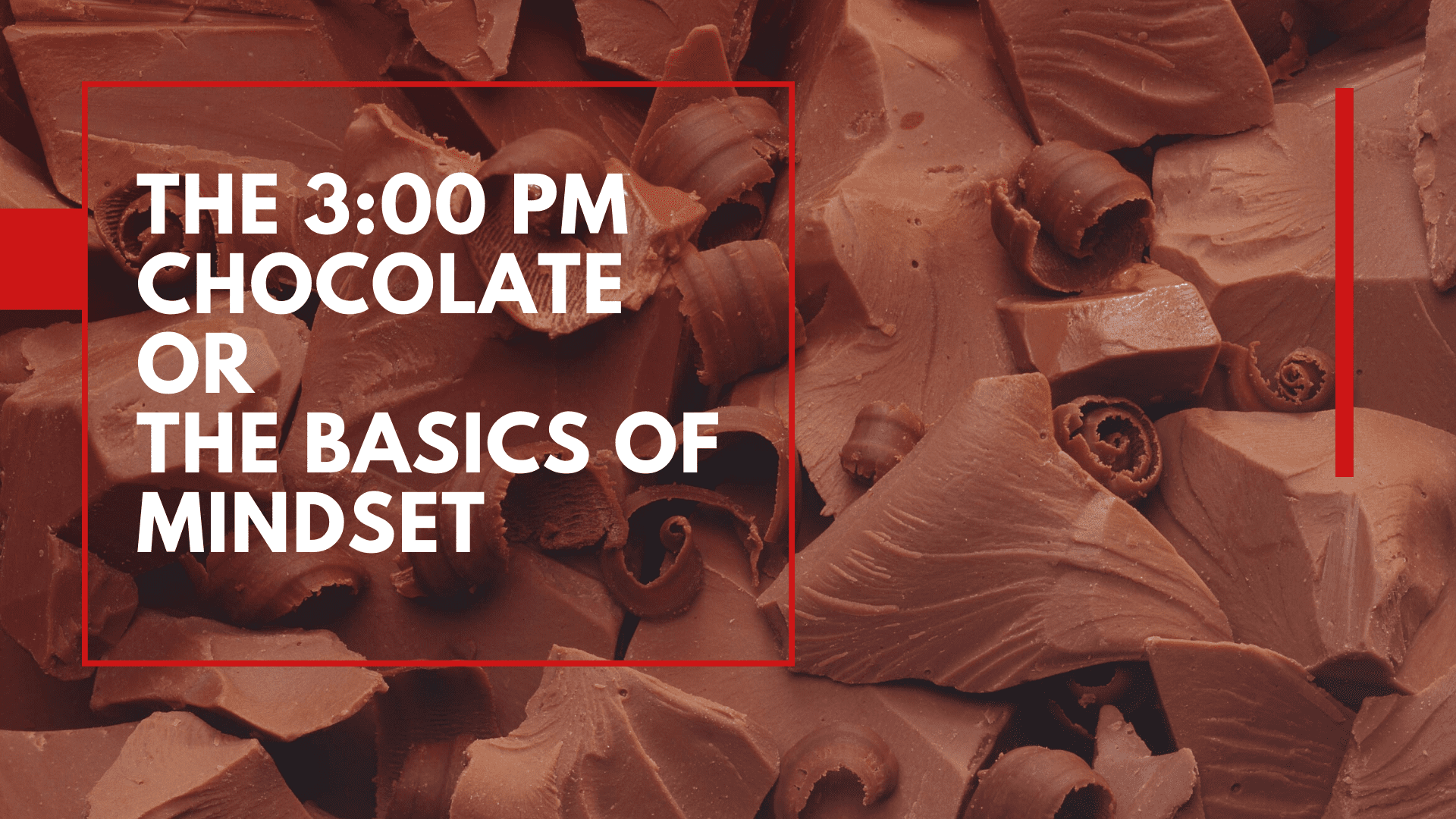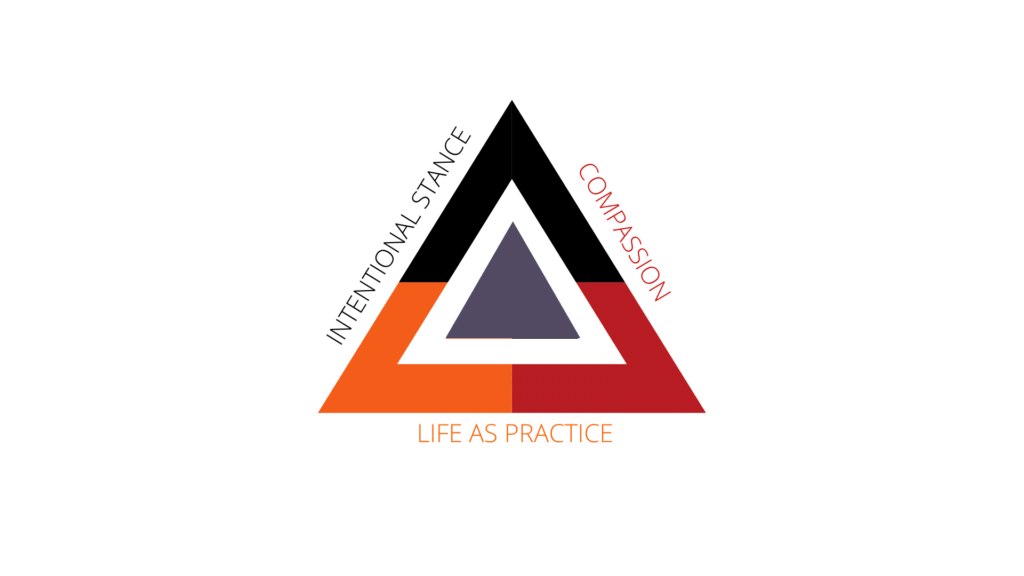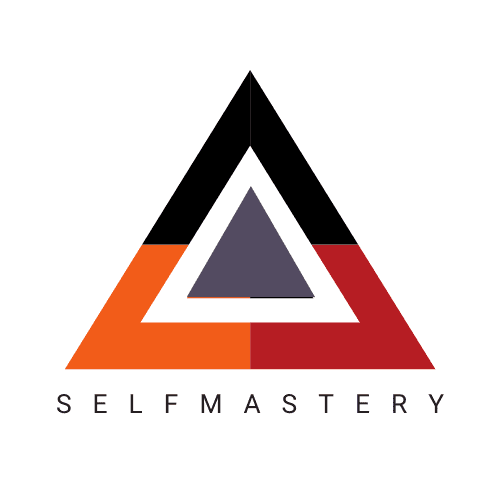
22 Jan The 3:00 PM Chocolate: the Basics of Mindset
Mindset Definition
Let’s be mathematical today and start by defining what we are talking about: mindset. A mindset is a set of ideas or assumptions that mediate our behaviors. This mediation is bi-directional: mindset can determine our behaviors, just as much as our behaviors can determine our mindset. Long-held mindsets become our core beliefs and define how we see ourselves in the world. So if you think you are bad at math, that conditions your behaviors around numbers and mathematical problems. Which means you don’t even try to do the tip on your bill at a restaurant. On the other hand if you consistently and intentionally practice German each day with the help of a good program and a good teacher, you will end up learning German. In turn you will end up creating a mindset in which you think of yourself as a smart person who can learn new languages. That’s it. The mindset model is simple and useful. The great thing about it is that it allows change to happen. Your mindsets and core beliefs can be modified and re-wired.
Mindset’s Basic Skillset
In order to master your mindset you have to get a hold on how to be able to change and rewire those core beliefs. That requires three basic skills:

Intentional Stance. We live mostly in automatic mode. You don’t think about the position of your fingers when you tie your shoes, you just tie your shoes. Thinking is hard and expensive in terms of energy, which is why we mostly live by habit. However our habits always have an intention and a purpose -no matter how automatic they are. Sometimes that intention is very evident and explicit, but sometimes that intention is lost to us. The problem is that every time you do a repetition of a habit, you confirm whatever is your mindset around that habit. If we don’t see the intention behind habits and behaviors clearly, we are left confirming mindsets that are detached from reality, and hence unproductive. For example, people often think they are fat as if that is an essential characteristic of their self. They see eating something besides lettuce as a confirmation of their fatness. This is a common mindset that is culturally ingrained and super unproductive. Let’s refine our example a little, and see how this works.
Let’s say that you have this I-am-a-fat-person-mindset and you find yourself eating chocolate at the office every afternoon. If you don’t take a step back and analyze what that habit is doing for you, your very core belief that you are just a glutton is all you have left. So every time you eat chocolate, you confirm that mindset. On the other hand, if you realize that you always eat chocolate in the afternoon at the same time, around 3:00PM shit starts changing. If you realize this is around the time when you check your daily to-do list and you usually realize you have too many items still undone, you start seeing a pattern. You might realize that chocolate has nothing to do with your gluttony. On the other hand it has everything to do with you putting way more things than you can handle on your to-do list. This creates a daily stressor that makes you feel you are always behind. This nasty feeling is soothed by the endorphins that chocolate provides. The fact that you have done this for the last 3 years religiously at 3:00PM has cemented this behavior as automatic. The cool thing is that as soon as you observe the real purpose of this habit, it loses its power: the chocolate is there to soothe your anxiety, not because you are a fat person with zero willpower. Just realizing the true impact of this habit, the mindset of you being a fat person removes this daily confirmation.
The intentional stance is fundamental in the other direction as well. If you want to create a new mindset, you need to create a set of behaviors that you will repeat in order to confirm it. This mindset and the intention of your behaviors have to be aligned towards your goal. This process is not automatic–quite the opposite, it is artificial and effortful, especially at first. In our chocolate example you will need to confirm the mindset that you are a person capable of change. A simple behavior that would confirm this could be curating your to-do list early in the morning. Instead of writing a list of all the things that are in your head (just an anxiety list) you make a list of 2-3 crucial things you can confidently complete with the quality you want. Every day when you complete this to-do list, you confirm to yourself that you can focus on what matters most and that you’re diligent and committed to quality. When the 3:00 pm time comes around, you are not stressed anymore about what you have not done, you feel accomplished and powerful, you know you are capable of change and hence saying no to that chocolate is so much easier. BOOM! Making this into a habit will take time and repetition but reminding yourself of the intention behind it will make it that much easier. One day it will become automatic.
Compassion. In our chocolate example, we also used compassion. This is the fundamental skill you need in order to analyze your and other people’s behaviors. This analysis is fundamental to identify and modify your mindset. In the patriarchal and modern ethos in which we live, the belief that you can be truly objective and separate your understanding of the world from what you ate for breakfast is deeply held. I disagree: nothing kills my intellectual powers like indigestion. I also know that when my wife is having a difficult time, my world view goes to shit. Objectivity is an awesome ideal, but it does not exist. Trying to achieve it denies our true experience of the world. Accept fully your subjectivity so that it does not blur your views. Our brain is an organ of our bodies whose functioning is mediated by the rest of our bodies. This mediation does not prevent us from looking at facts at face value. But it does shape the meaning we give to those facts and what our actions are, and that is what matters. In analyzing your behaviors compassion is key. First you have to understand that analysis requires your body to be in the right place: your autonomic tone has to be in parasympathetic mode –i.e. you have to be chill. What’s the best moment to analyze? After a massage, who would have guessed? If you try to analyze your chocolate habit at the end of a stressful day, all you will be able to see is that you just cannot fucking stop yourself from eating that stupid thing. If on the other hand, you are super chill and think about that problem in the third person as if it were happening to your very good friend, suddenly you will be able to actually see it clearly and attack it.
Second, compassion requires you to accept that you are just another human. Yes, you are unique –just like everybody fucking else. Your perspective is just one of many, and that is important. The cool thing about this second point is that the moment you realize you are just another human, and that we all have that 3:00 PM chocolate in one form of another, that chocolate loses power and you can look at it for what it is. You are not a terrible weak person, you are just a human doing what we all do. This aspect of compassion will keep you honest. It will lower your defenses and will allow you to see the facts. You have eaten chocolates for the past 3 years at 3:00 PM, that’s a fact. Knowing this will make it easier for you to accept that this will be a hard habit to break, your expectations will be more accurate.
The last important step in finding this kind of compassion is keeping an eye on the big picture. Just like you have to accept that you are just another human, you have to be able to place yourself in a larger context. Your behaviors and ideas are momentary; they go and flow. Looking at them as data points in a complex web is fundamental to understanding them fully. The chocolate habit can only be understood in the great scheme of your work routine. Isolating this to the event itself can only be explained by the fat mindset, but looking at the bigger picture allows you to contextualize it. And context matters and helps build richer understanding.
Life as practice. The last skill you will need in order to be able to change and master your mindset is that of approaching life as practice. When we are practicing something, we are automatically open to observing and analyzing outcomes. In practice mode your context is controlled and the impact of your mistakes is small. This means you are open and ready to embrace mistakes. This is fertile soil for learning and growing. Here you are always open to a new approach because nothing is definitive, nothing is forever and the stakes are lower. You can truly be process-oriented. Changing and optimizing your to-do list system will be an on-going project in which you will only get better. You will test and retest, refine and observe. Every day will be an experiment. Every day will give you information. You will not only build up the mindset that you can change, you will also create and reinforce the habit that you can always get better. You moved from a fixed to a growth mindset, which is always the point.
Of all three aspects I’ve discussed, this is the easiest to understand, and yet it is also pretty hard to apply. In our daily life, everything seems so high-stakes; you only have one chance at this thing, right? Sure, but that’s just living with the pressure of death. Let go of that, dive fully into life and practice this business of being a better human every day. It will make your life more fulfilling and less stressful.
These three basics skills of mindset are all sides of the same triangle. They all feed off each other. They all require each other and inevitably one will lead to the other. The direct application of these three aspects is how you modify and create your mindset and hence your core beliefs. Being able to change these is a true superpower: it is the ability of changing the lenses of how you see yourself and your relationship with the world. Master these basic skills, and you will master your self.


